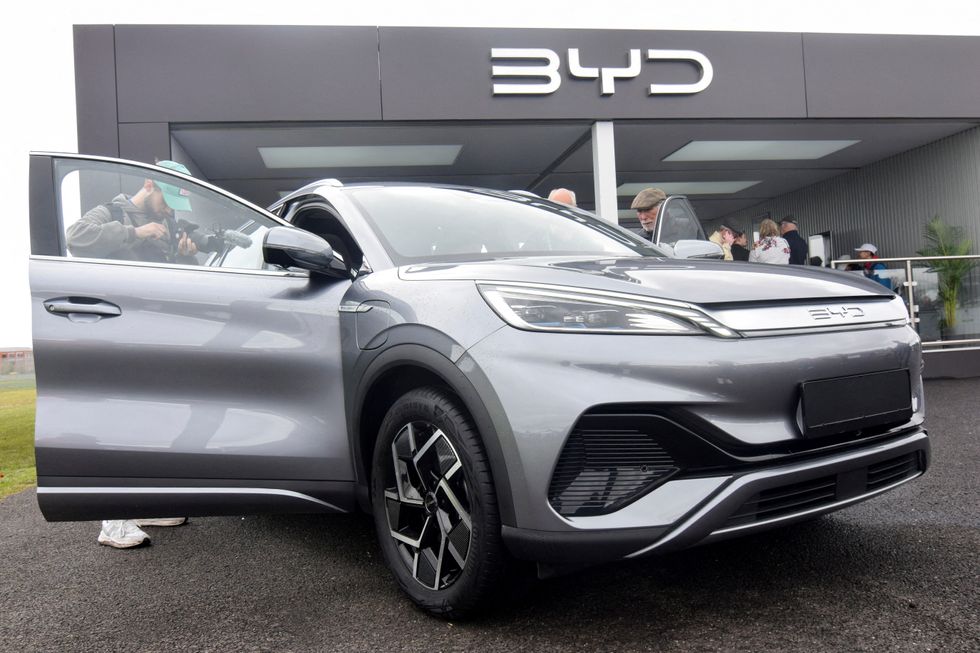Felix Reeves
Guest Reporter

Chinese electric vehicle manufacturer BYD has achieved a significant milestone, surpassing Tesla in quarterly revenue for the first time, causing a potential headache for billionaire owner Elon Musk.
In the third quarter of 2023, BYD reported revenue of 201.1 billion yuan (£21.8billion), marking a 24 per cent increase from the previous year.
In comparison, BYD eclipsed Tesla's revenue of $25.2billion (£19.5billion) for the same period, marking the first time this has happened.
The Shenzhen-based company's net profit rose by 11.5 per cent to 11.6 billion yuan (£1.26billion). However, Tesla still maintained a higher profit margin, earning $2.2billion (£1.7billion) in the quarter.
Do you have a story you'd like to share? Get in touch by emailing [email protected]

This achievement underscores BYD's rapid growth in the electric vehicle market, particularly in its home country of China, where it has become the best-selling carmaker.
Tesla's dominance in the global EV market could be facing a massive challenge from BYD as it looks to increase its influence across the world.
Other factors could involve the static lineup of Tesla's electric vehicles, as well as shifting focus towards ramping up production of its Cybertruck.
Meanwhile, BYD has benefited from a strong hybrid vehicle lineup, which has insulated it from waning consumer demand for pure electric cars.
The Chinese firm's hybrid models, with upgraded powertrains offering ranges of over 2,000km (1,242 miles) have significantly contributed to its revenue surge.
Despite BYD's revenue milestone, Tesla maintains its position as the world's most valuable carmaker, largely due to its artificial intelligence potential and longer-standing lead in global EV sales.
BYD's global expansion plans face challenges, particularly in Europe. The European Union recently imposed higher tariffs of up to 45 per cent on Chinese EVs, potentially impacting BYD's market entry.
Despite this setback, BYD has set ambitious export targets. The company aims to double its overseas shipments to 450,000 vehicles this year, a slight downward revision from its initial goal of 500,000.
To circumvent tariffs, BYD is establishing production facilities in Europe. The company announced plans to invest $1billion (£773million) in a plant in Turkey, which has a customs union with the EU.
BYD's overseas sales are growing, with 94,477 cars sold abroad in the third quarter, a 32.6 per cent increase from the previous year.
However, the company still sells more than 90 per cent of its cars in China, highlighting the importance of its domestic market.
BYD, which has seen an explosion in exposure across Europe after it sponsored the 2024 European Championships, currently advertises five vehicles for its UK offering.
LATEST DEVELOPMENTS:
- Classic car owners refuse to convert vehicles to electric - 'Destroys the essence of that era!'
- DVLA to roll out huge update for medical driving licence decisions as Britons could see changes soon
- Major car tax update is 'exactly the right move' despite costing petrol and diesel drivers £5,490

This includes the Sealion 7 SUV, the 260-mile range ATTO 3, the Dolphin, Seal U DM-i hybrid and its flagship Seal, with a WLTP range of 354 miles.
According to the latest data from the Society of Motor Manufacturers (SMMT), BYD has sold 5,260 vehicles in the UK, enough for a market share of 0.35 per cent.
So far this year, the Chinese brand has sold more vehicles than established manufacturers like Bentley, DS, Maserati, Smart and Subaru.
Find Out More...
